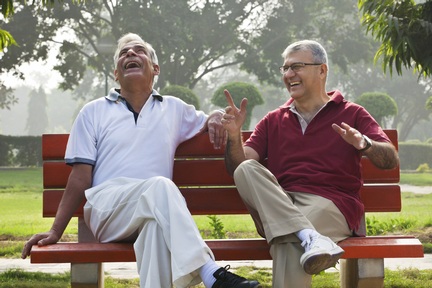ONS says Older people are ‘happy, confident & adventurous’

ENRICHEnabling Research in Care Homes
NEWS ARCHIVE
ONS says Older people are ‘happy, confident & adventurous’
Melissa McAlees - www.carehome.co.uk
Recent research conducted by the Office for National Statistics (ONS) has revealed that older people tend to be happier than their younger counterparts.


The report, commissioned by Cigna Insurance Services, found that people aged between 20 and 50 scored progressively lower in measures of happiness, compared to those aged 50 and over.
Lead researcher Paul Flatters, chief executive of the Trajectory Partnership, said: “The changing social and economic outlook of people in late middle-age is one of the defining characteristics of our era.
“People are refusing to be defined by a number that ticks up as each birthday goes by. Older people in Britain are happier, more confident, and more adventurous than ever before.
“People aged 50 and over represent a third of the population and are set to grow by 25 per cent in the next 20 years. A time of life that would once have been seen as twilight is now viewed as a time of adventure, opportunity and change.‚Äù
A study of 2,000 adults revealed that Britain’s 50 to 70 year-olds are becoming happier with age, with 60 per cent of those aged 65 suggesting life improves once they reach their 50th birthday.
For those already in their seventh decade, male respondents suggested that old age does not begin until the age of 77 – just four years short of Britain’s average life expectancy. Female respondents said that old age begins slightly earlier at 69 years of age.
Although people aged 50 and over currently represent a third of the UK’s population, many suggest that they have experienced discrimination. More than a third of over-65s said businesses treat them as ‘old’, while 28 per cent of over-50s said they have lied about their age because they were ‘frustrated by low expectations of them’.
Mr Flatters added: ‚ÄúOlder people are refusing to be defined by their age and they will bristle at being put into a box marked ‘past it’ or labelled as ‘grey’ or ‘silver-surfer’.
“Average life expectancy has increased at a remarkable pace. The length of time we can expect to live grows by two and a half years every decade Рthat amounts to average longevity for the population in modern societies rising by six hours every day.
‚ÄúThe point at which people consider themselves to be ‘old’ is extending further into the late 60s as people recognise that they have decades of active life ahead.”
Previous research has identified several factors which may contribute to the relationship between happiness and age.
As people age they move onto different stages of life when demands on their time and money, experienced uncertainty and other negative features tend to decline. As children grow up, jobs and other activities become established and care-dependent relatives pass away, leading to reduced strain and an increase in people’s overall well-being.
However, the opportunity to influence surroundings in ‘mid-life’ can be substantially impaired due to conflicting demands. This, alongside other aspects of a person’s environment, can depress happiness in middle-age. The ONS research supports Dr Ioana Ramia’s findings from the University of New South Wales, which identified that although middle-age is the ‘unhappiest’ time of people’s lives, people tend to feel better about themselves as they get older. She said: ‚ÄúLife satisfaction decreases from the early 20s, plateaus for about 40 years and then increases from about 55 years and over.‚Äù
Mr Flatters concluded: “Walter Pitkin was spot on, back in the 1930s, to say that life began at 40. But that very attitude now applies to the over 60s who have more choices than ever before about how to spend their retirement.
‚ÄúThere is no longer an assumption that advanced years are a time to wind down and switch off – a world of opportunity is open to Britain’s modern day mature generation.‚Äù